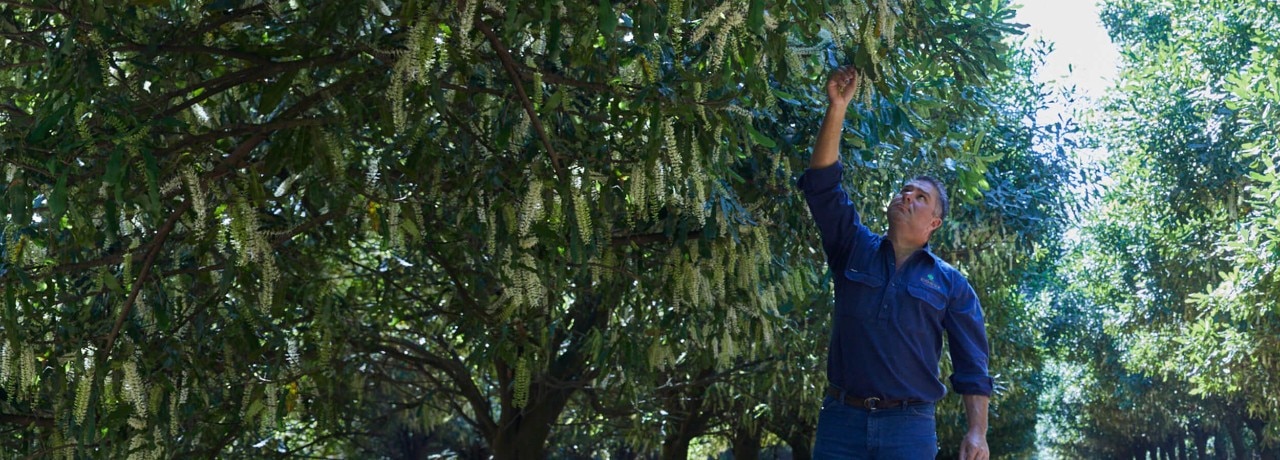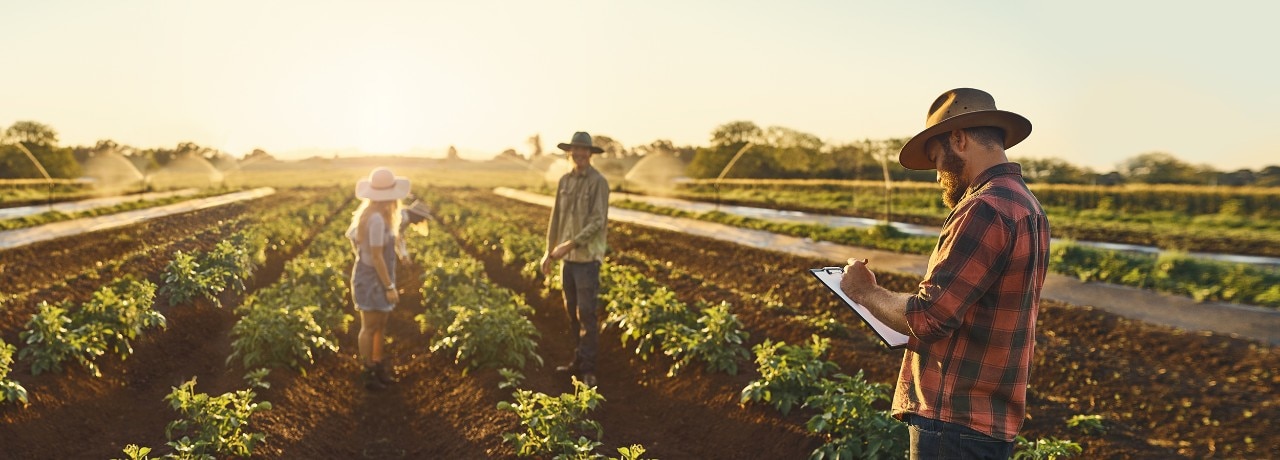How Costi Farms helped take macadamias global - NAB
Peter Costi has been instrumental in making Australia the global hub of macadamia production. Recognising that scale would stabilise the industry, he bought established farms that were already fruiting and set about increasing their yield. In the process, he has become the world’s second-largest macadamia producer.
How it started
While the macadamia nut is an Australian native, it was the Hawaiians who first commercialised it. But it’s Bundaberg grower Peter Costi who’s been influential in bringing large-scale commercial macadamia farming back to Australia and turning what was a small industry into one capable of meeting booming global demand. He’s done it by continually adapting his production systems to meet growing and changing consumer demands.
It was close family friend Phil Zadro (now a global macadamia king) who got Costi hooked on Australia’s native nut.
“You could say I did my apprenticeship with Phil before buying my own farm,” Costi says.
As well as learning about farming, the experience helped sharpen Costi’s business sense. He recognised that, while macadamias’ long lead-time made them a difficult commercial crop, handled the right way that could actually be an advantage.
He lays the numbers on the table.
“You’ll get your first crop off a tree at eight years and break even in year 14,” Costi says, pointing out that very few companies have the capacity to finance that time frame.
“That’s where I saw such strength in the product. Macadamias aren’t like opening a coffee shop – you can’t just pick one off the shelf and start. You really have to know your stuff and I’d been taught well.
“By the early 2000s, a lot of macadamia farms were struggling.
“I understood the market was changing, and that consistent quality and quantity were key. Since I knew I could turn most farms around very quickly, I decided to go out and purchase as many as I could. It was cheaper than waiting eight years and it’s basically how we more than doubled our operation in four years.
“NAB understood the importance of scale and the rationale for buying established farms. They supported us growing quickly and also the need for adding processing and packing facilities.”
Game-changing technologies
Costi is adamant that the competition isn’t other macadamia growers.
“It’s other nuts. We need more macadamias to meet the market. We need larger operations to guarantee supply to big customers like China and the US.”
According to Costi, the industry turned the corner once it reached mass production stage, in about 2010. “Phil Zadro’s farms started coming online and the industry had the quantity to go to big customers and say, ‘Yes, we can guarantee you this much this year and that much next year’.”
Costi Farms is also a shareholder in the new production facility at Bundaberg, Pacific Gold Macadamias (PGM), which supplies major supermarket chains in the US as well as Australia.
“Being involved in the processing facilities was a logical extension for us,” Costi explains. “Customers want to have traceability of the whole process, so we give it to them.
“The end user wants guaranteed supply and complete traceability. They want to deal with one contact that can guarantee supply from shareholder growers providing traceability from the farm gate all the way through processing to the end product on the shelf.”
It may be hard to believe for anyone who’s tried to crack a macadamia shell but Costi says the biggest issue with the nuts is their fragility.
“They’re designed to germinate, and we’ve got to get them off the trees before they start. We can’t leave them on the ground for too long, either. The shell is designed to get wet, dry out, get wet, dry out, until it sprouts. And then you’ve got a product with poor shelf life.
“The way we harvest and screen is continuously changing. We’re now harvesting with mechanical shakers. It’s about getting the product into the facility quickly.”
To further maintain quality, Costi has added high-speed colour sorters, similar to those used in the factories. On the farm, they look at the quality of nuts in-shell and at the factory they monitor the quality of the kernel.
“We can change the colour sorter to suit our production for the day and watch it live from anywhere in the world,” Costi says. “It’s been a game-changer in terms of getting the quality needed to sustain shelf life.”
Tough nuts to crack
The Chinese and American markets place different demands on macadamia producers.
“The Chinese prefer their nuts in-shell so PGM exports its macadamias in-shell to them. In China, they roast the nuts with a little cut in the shell and add flavouring. It’s a little innovation of theirs.”
Costi acknowledges that Chinese demand has brought stability to the market over the last five years. “We say we can deliver 20 containers but they’ll want 40 or 100,” he grins. “We can’t meet demand.”
Like Australia, Americans prefer their macadamias shelled. They also demand pasteurisation to protect against salmonella. While not all buyers request this from PGM, the factory is in the process of adding pasteurisation to the entire shelled crop. “You’ve got to pre-empt consumer demands,” Costi says. He emphasises that, no matter who your customer is, keeping ‘clean and green’ is paramount.
“We invest heavily in soil health by composting manures, using less chemical fertilisers and spraying with Tasmanian seaweed.
“All our farms are also Freshcare accredited. If you’re not implementing these changes, you’ll get left behind,” Costi warns, adding that “it’s about continuously reading the market direction and trends and adapting to meet it in the near future”.
Zero-waste produce
Farm gate waste isn’t an issue on Costi’s farms. Taking advantage of the rise in the popularity of nuts, he’s implemented a zero-waste policy. “There’s been a rise in ‘manufacturing grade’ products, which have helped diversify the industry by using second-grade product.” These include chips for baked goods, flour, milk, oil and even stock feed.
“Macadamias have a higher BTU [British thermal unit] than coal, and at our Lismore facility we’ve installed a nut dryer powered by burning the macadamia shells,” Costi explains.
He points out that innovation isn’t about one giant thing: “It’s trying lots of little things and seeing which work. The one thing I know is that, as a business, you have to keep improving and growing… stay still, you’re going to die.”
How to expand your business overseas
If going international matters to you, we're here to make it happen.
Other business moments
Tips for growing an international business
Cover your bases with proper planning, preparation – and funds.
Finding the right foreign exchange solution
Here's how to find the right solution for your business.
Grow your business by hiring the right staff
Tips to help you find workers who are right for the job.
Related products and services
International and foreign exchange
If you’re in the business of importing or exporting, our foreign currency accounts, international payment options and trade finance can all help.
Business car and equipment finance
Find the right finance solution for your vehicle and equipment needs.
Trade finance
Meet your working capital needs with finance for your export, import and domestic trade purposes.
Get in touch
Contact us
Explore our business banking contact information and get support with a wide range of products, services and topics.
Visit a NAB branch
Our business bankers are located all around Australia.
Important information
Apologies but the Important Information section you are trying to view is not displaying properly at the moment. Please refresh the page or try again later.
The information contained in this article is intended to be of a general nature only. It has been prepared without taking into account any person’s objectives, financial situation or needs. Before acting on this information, NAB recommends that you consider whether it is appropriate for your circumstances. NAB recommends that you seek independent legal, financial and taxation advice before acting on any information in this article.




